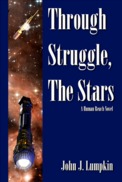
| Series: | Human Reach #1 |
| Publisher: | John J. Lumpkin |
| Copyright: | July 2011 |
| ISBN: | 1-4611-9544-6 |
| Format: | Kindle |
| Pages: | 429 |
This is an ebook, so metadata may be inaccurate or missing. See notes on ebooks for more information.
Never let it be said that I don't read military SF. However, it can be said that I read books and then get hellishly busy and don't review them for months. So we'll see if I can remember this well enough to review it properly.
In Lumpkin's future world, mankind has spread to the stars using gate technology, colonizing multiple worlds. However, unlike most science fiction futures of this type, it's not all about the United States, or even the United States and Russia. The great human powers are China and Japan, with the United States relegated to a distant third. The US mostly maintains its independence from either, and joins the other lesser nations and UN coalitions to try to pick up a few colonies of its own. That's the context in which Neil and Rand join the armed services: the former as a pilot in training, and the latter as an army grunt.
This is military SF, so of course a war breaks out. But it's a war between Japan and China: improved starship technology and the most sophisticated manufacturing in the world against a much larger economy with more resources and a larger starting military. For reasons that are not immediately clear, and become a plot point later on, the United States president immediately takes an aggressive tone towards China and pushes the country towards joining the war on the side of Japan.
Most of this book is told from Neil's perspective, following his military career during the outbreak of war. His plans to become a pilot get derailed as he gets entangled with US intelligence agents (and a bad supervisor). The US forces are not in a good place against China, struggling when they get into ship-to-ship combat, and Neil's ship goes on a covert mission to attempt to complicate the war with political factors. Meanwhile, Rand tries to help fight off a Chinese invasion of one of the rare US colony worlds.
Through Struggle, The Stars does not move quickly. It's over 400 pages, and it's a bit surprising how little happens. What it does instead is focus on how the military world and the war feels to Neil: the psychological experience of wanting to serve your country but questioning its decisions, the struggle of working with people who aren't always competent but who you can't just make go away, the complexities of choosing a career path when all the choices are fraught with politics that you didn't expect to be involved in, and the sheer amount of luck and random events involved in the progression of one's career. I found this surprisingly engrossing despite the slow pace, mostly because of how true to life it feels. War is not a never-ending set of battles. Life in a military ship has moments when everything is happening far too quickly, but other moments when not much happens for a long time. Lumpkin does a great job of reflecting that.
Unfortunately, I thought there were two significant flaws, one of which means I probably won't seek out further books in this series.
First, one middle portion of the book switches away from Neil to follow Rand instead. The first part of that involves the details of fighting orbiting ships with ground-based lasers, which was moderately interesting. (All the technological details of space combat are interesting and thoughtfully handled, although I'm not the sort of reader who will notice more subtle flaws. But David Weber this isn't, thankfully.) But then it turns into a fairly generic armed resistance story, which I found rather boring.
It also ties into the second and more serious flaw: the villain. The overall story is constructed such that it doesn't need a personal villain. It's about the intersection of the military and politics, and a war that may be ill-conceived but that is being fought anyway. That's plenty of conflict for the story, at least in my opinion. But Lumpkin chose to introduce a specific, named Chinese character in the villain role, and the characterization is... well.
After he's humiliated early in the story by the protagonists, Li Xiao develops an obsession with killing them, for his honor, and then pursues them throughout the book in ways that are sometimes destructive to the Chinese war efforts. It's badly unrealistic compared to the tone of realism taken by the rest of the story. Even if someone did become this deranged, it's bizarre that a professional military (and China's forces are otherwise portrayed as fairly professional) would allow this. Li reads like pure caricature, and despite being moderately competent apart from his inexplicable (but constantly repeated) obsession, is cast in a mustache-twirling role of personal villainy. This is weirdly out of place in the novel, and started irritating me enough that it took me out of the story.
Through Struggle, The Stars is the first book of a series, and does not resolve much by the end of the novel. That plus its length makes the story somewhat unsatisfying. I liked Neil's development, and liked him as a character, and those who like the details of combat mixed with front-lines speculation about politics may enjoy this. But a badly-simplified mustache-twirling victim and some extended, uninteresting bits mar the book enough that I probably won't seek out the sequels.
Followed by The Desert of Stars.
Reviewed: 2015-08-30